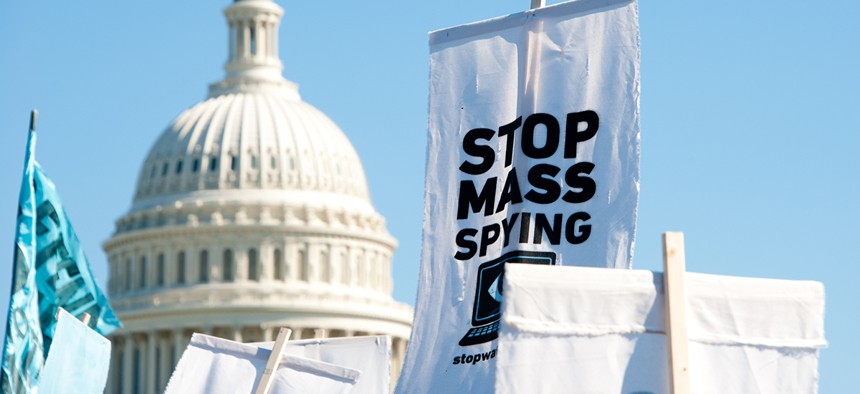
Protestors rally against NSA surveillance in Washington in 2013. Rena Schild / Shutterstock.com file photo
House Lawmakers Float Bill to End NSA Mass Surveillance
A bipartisan group is launching a final push to reform the government’s spying apparatus.
An influential bipartisan group of House lawmakers is set to reintroduce legislation Thursday that would rein in the National Security Agency's domestic surveillance authorities, a push that comes nearly two years after the Edward Snowden disclosures rocked the intelligence community, National Journal has learned.
The bill would effectively end the government's bulk collection of U.S. phone records, the first and most controversial of the spying programs exposed by Snowden, a former NSA contractor now living in Russia under asylum. It would instead allow intelligence agencies to ask for call metadata—the numbers, time stamps, and duration of a call but not its content—from phone companies on an as-needed basis after obtaining judicial approval.
According to a fact sheet of the bill circulated among lawmakers and obtained by National Journal, the bill would allow U.S. tech firms like Google and Facebook to disclose more information about government data requests made via the Foreign Intelligence Surveillance Court, including an additional band of reporting. The measure additionally would give these companies more flexibility in how they can respond to national security orders.
The measure, known as the USA Freedom Act, would also strengthen the definition of a "specific selection term," which places limitations on how broadly a surveillance target can be defined, according to the summary.
Lawmakers plan to rush the bill through the House Judiciary Committee in hopes of earning a full floor vote as soon as next week. The urgency comes as three core provisions of the Patriot Act are due to sunset on June 1, including Section 215, which the NSA uses to justify its phone dragnet.
A congressional staffer said the "ink had dried" on the bill and that it should be introduced Thursday, barring any last-minute obstacles. House Judiciary Chairman Bob Goodlatte, ranking member John Conyers, and Reps. Jerrold Nadler and Jim Sensenbrenner—the original author of the post-9/11 Patriot Act—are all original cosponsors.
The introduction also comes just days after Senate Majority Leader Mitch McConnell introduced a bill seeking a clean reauthorization of the Patriot Act's expiring provisions—absent reform. The House measure would reauthorize the provisions until December 2019, but end bulk call surveillance and usher in several transparency and privacy reforms.
The bill does include a concession made to the House Intelligence Committee regarding the monitoring of foreign targets who relocate to the U.S. The change will allow for that foreign surveillance to continue up to 72 hours under limited circumstances to prevent intelligence agencies from "going dark" on surveillance as they seek approval for a domestic warrant.
Privacy advocates briefed on the change indicated it was not likely to be a concern and not something that directly implicated mass surveillance.
Another change unrelated to surveillance increases the maximum penalty for those who offer material support to terrorism from 15 to 20 years.
A version of the Freedom Act passed the House overwhelmingly last year before the lame-duck Senate came two votes short of advancing a similar measure. The fact sheet promises the new bill ensures "more protections for civil liberties while protecting national security" compared to last year's offering.
If the new language has the blessing of the House Intelligence Committee, it could again sail through the chamber easily—though the panel's chairman, Rep. Devin Nunes, has said he would be fine with a clean reauthorization.
The Senate, however, remains a challenge for reformers hoping to beat the clock. Senate Judiciary Chairman Chuck Grassley has been deep in negotiations about the bill, but he has said he still needs to have more discussions with the Senate Intelligence Committee before moving forward. And with McConnell's bill out and in the fast-track lane, many privacy advocates worry his language will be used as a base bill to tack on less meaningful reforms than what the Freedom Act offers.
(Image via Rena Schild / Shutterstock.com)
NEXT STORY: GOP Blocks Vitter's Obamacare Subpoena







